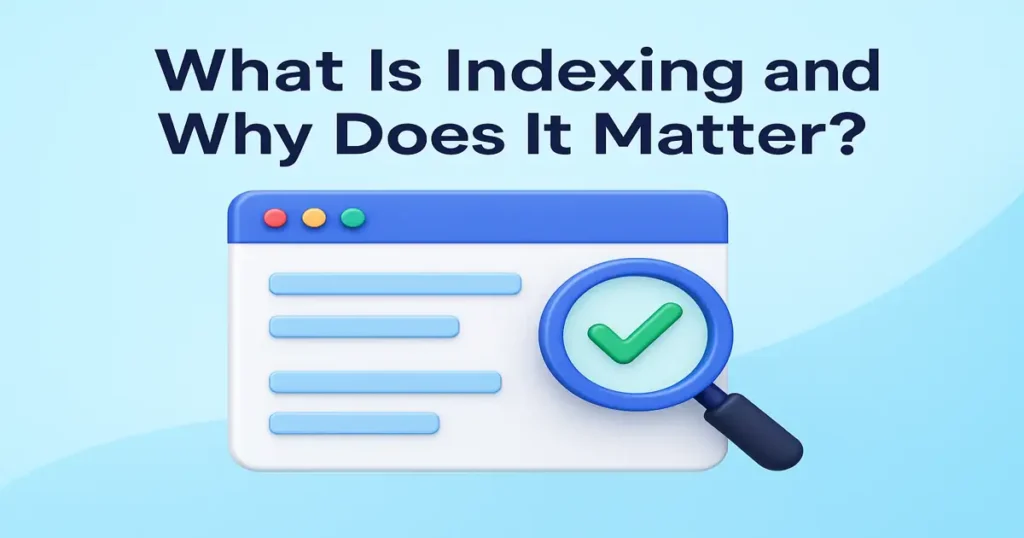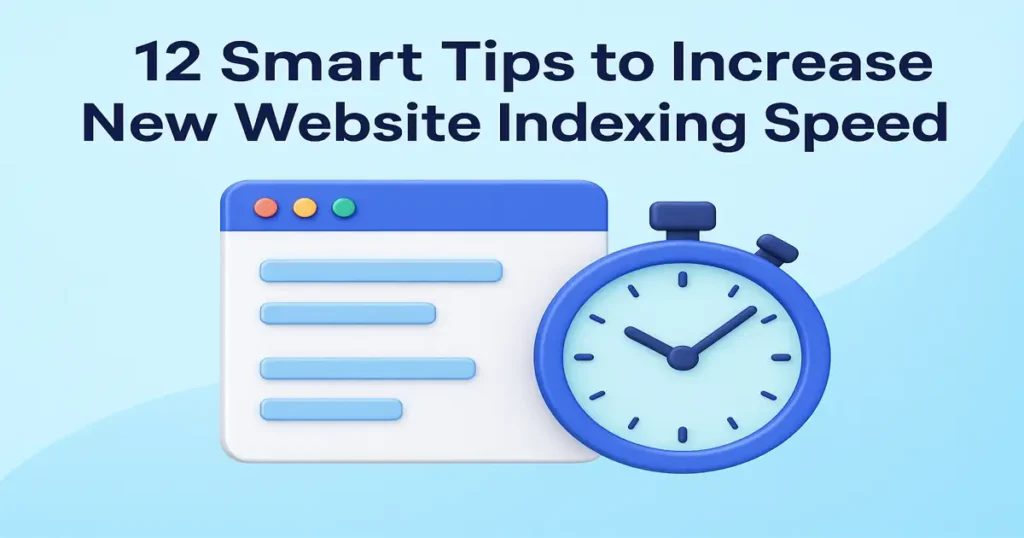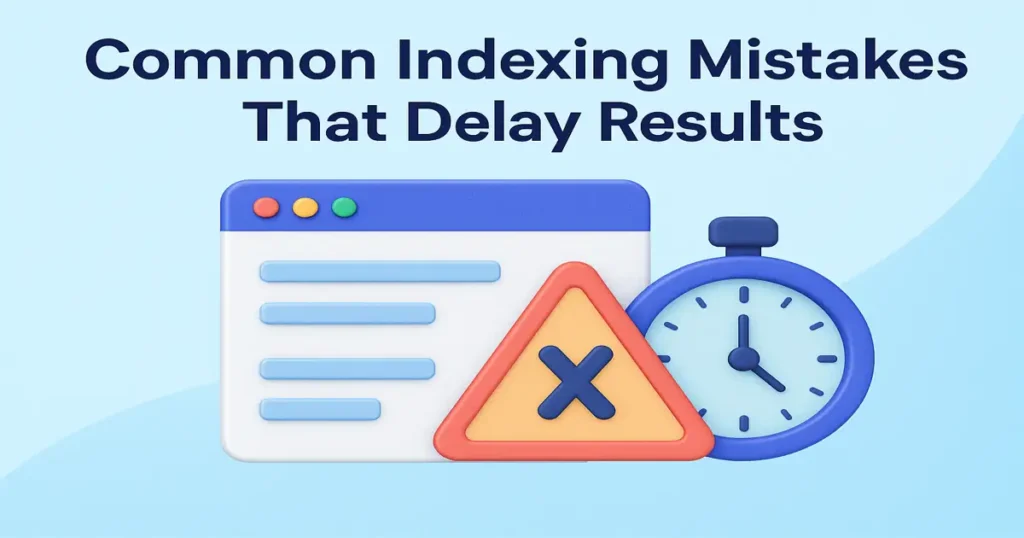Launching a brand-new website is exciting, but if your content isn’t being found by Google, that excitement can quickly turn to frustration. The truth is, your website won’t rank or bring in traffic unless search engines can first index your pages. And indexing doesn’t always happen automatically or quickly.
This guide walks you through 12 clear, proven, and practical ways to increase new website indexing speed. Whether using WordPress, another CMS, or a custom-built site, these methods will help your pages get discovered and indexed faster.
What Is Indexing and Why Does It Matter?

Indexing is the process where search engines like Google read, understand, and store your website pages in their database. Once your content is indexed, your pages become eligible to appear in Google search results.
Without indexing:
- Your content won’t rank on Google
- You won’t get organic traffic
- Even the best-written pages stay invisible
Fast and complete indexing is the first major step toward SEO success.
12 Smart Tips to Increase New Website Indexing Speed

Step 1: Submit Your Website to Google Search Console
Google Search Console, or GSC is a free tool by Google that lets you directly tell Google about your website.
To get started:
- Visit Google Search Console
- Add and verify your website
- Use the Google Search Console’s URL Inspection Tool to request indexing of new pages
- Check the Coverage Report for indexing issues
This helps you stay in control of how Google interacts with your site.
Step 2: Set Up and Submit an XML Sitemap
An XML sitemap acts as a roadmap of your website, guiding Google on which pages to crawl.
Pro Tips:
- Use WordPress plugins like Yoast SEO, Rank Math, or All in One SEO to generate your sitemap.
- Make sure it includes all your important pages
- Submit it under the Sitemaps section in the Search Console
This improves the discoverability of your site structure.
Step 3: Fix and Optimize Your Robots.txt File
The robots.txt file, file guides search engines on which parts of your website they are allowed to crawl.
Make sure to:
- Avoid disallowing essential folders or pages
- Include a direct link to your sitemap
- Double-check for conflicting rules
Use our Robots.txt Generator for an SEO-friendly file.
Step 4: Improve Internal Linking Across Your Site
Internal links guide Google from one page to another, helping it find and index all your content.
Best practices:
- Link new posts from your homepage or existing high-traffic pages
- Use keyword-rich anchor text naturally
- Avoid orphan pages (pages with no incoming links)
This makes website crawlability easier and improves content relationships.
Step 5: Boost Website Speed for Better Crawl Efficiency
Google’s bots crawl fast-loading sites more often. A slow website can cause crawling delays.
Here’s what helps:
- Compress images and minify scripts
- Use browser caching and lazy loading
- Ensure your site is mobile-responsive
You can analyze your performance with Google PageSpeed Insights.
For advanced help, explore our Speed Optimization Guide.
Step 6: Identify and Fix Crawl Errors Quickly
Google may skip over your pages if it encounters errors during crawling.
How to catch and fix them:
- Review the Crawl Stats in Search Console
- Fix broken internal links, redirect chains, and server errors (500, 403, etc.)
- Use tools like Screaming Frog to run detailed site audits
Fixing these ensures a smoother indexing process.
Step 7: Use Google’s Indexing API (When Applicable)
The Indexing API is ideal for specific content types like job posts, live event listings, and FAQs.
How to use it:
- Connect with plugins like Rank Math Instant Indexing
- Submit URLs directly for instant crawling and indexing
This feature can speed up indexing dramatically for qualifying content types.
Step 8: Create Original, High-Quality, and Relevant Content
Google prefers indexing content that is unique, detailed, and helpful.
What works best:
- Focus on solving specific user problems
- Use clear formatting with headings, subheadings, and bullets
- Avoid reusing content from other websites
Think quality over quantity, especially in early stages.
Step 9: Promote Your Pages on Social Media
Sharing your content helps create early visibility and sends discovery signals to Google.
Effective channels:
- Facebook, LinkedIn, Twitter/X, Reddit
- Use relevant hashtags and groups
- Share new posts consistently across platforms
The more visibility, the faster crawlers arrive.
Step 10: Earn Contextual and Authoritative Backlinks
Backlinks from trusted, relevant websites can help search engines find your content faster.
Smart tactics:
- Contribute guest posts to niche websites
- Offer expert insights to journalists (HARO, SourceBottle)
- Link new content from well-ranked existing pages on your own site
Quality matters more than quantity here.
Step 11: Optimize for Mobile Experience and Voice Search
Google uses mobile-first indexing, meaning your mobile version gets crawled first. Voice search optimization are also rapidly increasing.
How to optimize:
- Ensure your website functions smoothly across all types of devices.
- Use conversational tone and natural-language questions.
- Answer queries clearly and concisely.
This helps improve accessibility and crawl depth.
Step 12: Monitor Indexing Status and Make Data-Driven Changes
Indexing isn’t a one-time task. Keep tracking your site’s performance and adjust as needed.
How to monitor:
- Use “site:yourdomain.com” in Google to see indexed pages
- Review Search Console for pages marked “Discovered – not indexed”
- Use tools like Ahrefs, Semrush, or Screaming Frog for deeper insights
Staying proactive improves long-term visibility.
Common Indexing Mistakes That Delay Results

- Not submitting your sitemap
- Using noindex tags or disallow rules accidentally
- Leaving pages orphaned without internal links
- Hosting slow-loading or error-prone pages
- Publishing thin, low-quality, or duplicate content
Avoid these, and your indexing process becomes much smoother.
Final Thoughts
Speeding up the indexing of your new website is one of the smartest moves you can make to get seen online. These 12 strategies are designed to help your content appear in Google as quickly as possible.
Stay consistent, fix technical issues, and focus on high-quality content supported by effective technical SEO. If you do that, Google will not only index your content faster, it will rank it higher too.
For more help, explore our full Technical SEO Guide.
FAQs
How long does indexing normally take for new websites?
It depends on many factors, but with proper setup, indexing can happen in hours to days.
Can a sitemap really help with faster indexing?
Absolutely. It acts as a roadmap for search engines and ensures better content visibility.
What if my page isn’t getting indexed even after submission?
Use site:yourdomain.com/page-url in Google or check via the URL Inspection Tool.
Does sharing on social media actually make a difference?
Yes. It boosts visibility and can drive early signals that help search engines find your page.







